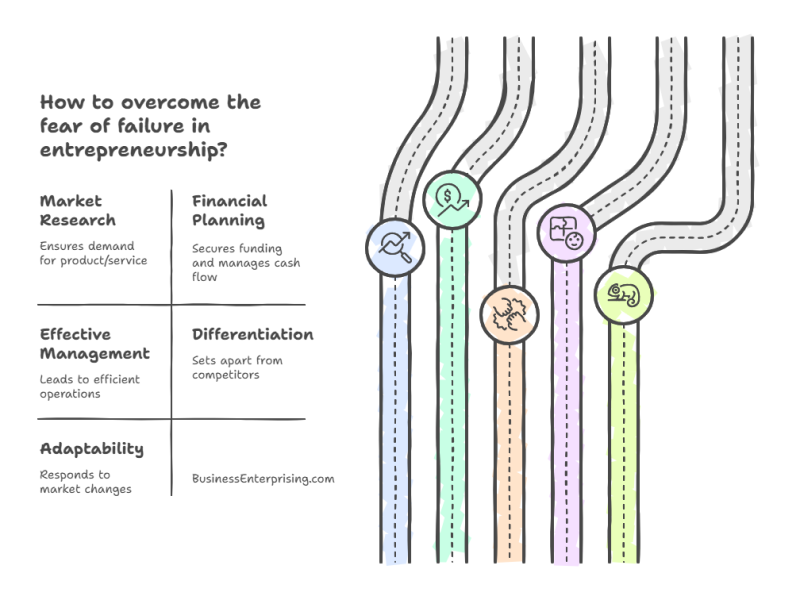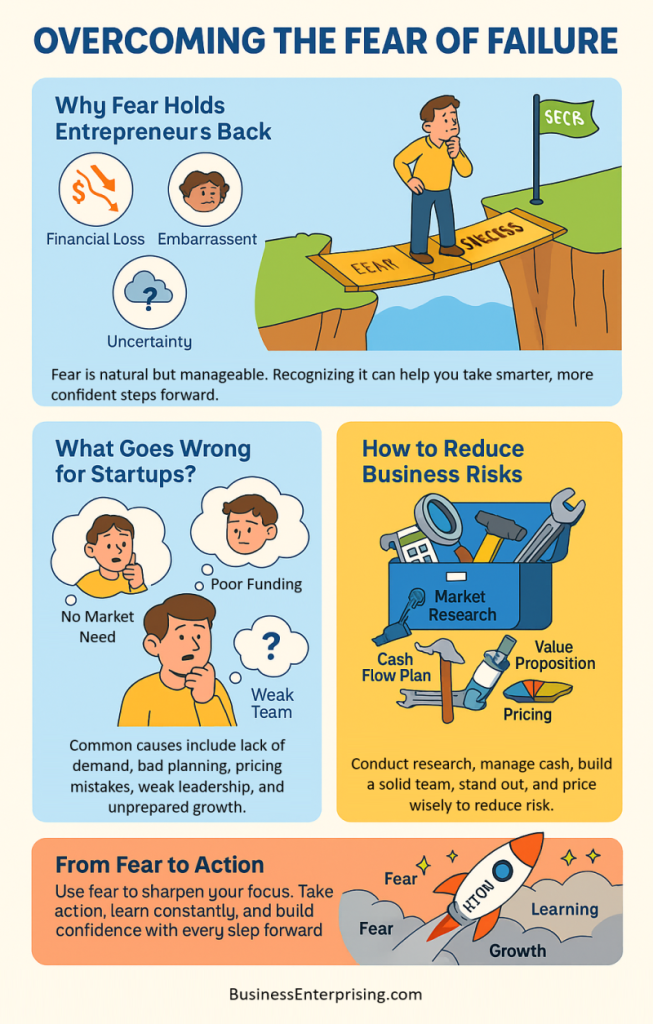 Overcoming the fear of failure is a common and often paralyzing concern for entrepreneurs. This fear can prevent many from taking the necessary steps to launch and grow their businesses. Understanding why startups fail and learning how to mitigate these risks can empower entrepreneurs to move forward with confidence. Below are the primary reasons behind most startup failures. We’ll offer practical strategies to reduce these risks, thereby increasing the likelihood of success.
Overcoming the fear of failure is a common and often paralyzing concern for entrepreneurs. This fear can prevent many from taking the necessary steps to launch and grow their businesses. Understanding why startups fail and learning how to mitigate these risks can empower entrepreneurs to move forward with confidence. Below are the primary reasons behind most startup failures. We’ll offer practical strategies to reduce these risks, thereby increasing the likelihood of success.
The Prevalence of Fear in Entrepreneurship
Fear is a common part of starting a business. You may worry about money, time, or what others will think if you fail. These concerns are natural and often arise before any major step forward. However, fear alone should not stop you from acting on your ideas.
Entrepreneurs face high uncertainty and personal risk. Therefore, it makes sense that many hesitate before launching something new. You might second-guess your plan or delay taking action. Additionally, public pressure or fear of embarrassment can make those doubts feel heavier. But acknowledging fear can also give you clarity.
Fear becomes a problem when it leads to inaction. That’s where many good ideas stall. However, by naming the fear and understanding where it comes from, you reduce its grip. You shift from emotional reaction to informed planning. That shift builds momentum and confidence.
Overcoming the fear of failure begins with perspective. Not every risk leads to disaster. In fact, many failures lead to growth, insight, and eventual success. Additionally, small steps often reduce the pressure to get everything right immediately. You learn, adjust, and move forward smarter.
You don’t need to ignore fear to move forward. Instead, treat it as a signal to slow down and think things through. Use it to sharpen your strategy. Also, remember that most entrepreneurs face the same doubts at some point. What matters most is how you respond.
With practice, you build tolerance for uncertainty. Over time, your decision-making becomes stronger and more grounded. That mindset will help you make better choices with less hesitation.
Reasons Why Many Startups Fail
Many startups fail for reasons that can often be avoided. The most common cause is building something with no real market demand. You may believe in your idea, but without paying customers, a business cannot survive. Therefore, testing your idea early is essential.
Additionally, funding problems frequently limit growth. Without enough capital, you cannot market effectively or manage operations. This often leads to early burnout or missed opportunities. However, planning your finances ahead of time reduces that risk. You need to know your numbers and plan for the gaps.
Poor team structure also leads to failure. A strong idea cannot make up for weak leadership or misaligned goals. Therefore, it helps to surround yourself with people who have the right skills and shared vision. Also, communication breakdowns can slow progress or create costly mistakes.
Pricing errors are another common issue. Some charge too much and lose buyers. Others price too low and lose profit. Additionally, competition may force you to rethink how you position your offer. Without a clear value and pricing strategy, the market may ignore you altogether.
Legal issues can also hurt a business before it grows. Problems like missing licenses or intellectual property disputes can stop progress fast. Therefore, it’s important to handle the legal basics early. You don’t need to be a lawyer, but you do need to protect your work.
Overcoming the fear of failure starts with understanding why failure happens. When you plan for these risks, you build a stronger foundation. You gain control over the things you can manage and react better to the things you cannot.
Risk Mitigation Strategies for Entrepreneurs
Reducing risk starts with research. Before you launch anything, you need to know your audience and what they actually want to buy. Conducting surveys or testing a small version of your product can reveal demand early. Therefore, you avoid building something that no one needs.
Additionally, a solid financial plan helps you stay prepared. Map out your expenses, income goals, and funding needs. If you expect gaps, identify possible solutions now. That might include investors, loans, or simple cost cuts. Also, keep cash flow steady by planning for both best and worst-case scenarios.
Your team also matters. Surround yourself with people who bring skill and stability. A good team can help you solve problems faster. Therefore, spend time hiring and training carefully. Build trust and share clear goals to keep everyone aligned. When people work well together, challenges become easier to manage.
Marketing is another area where preparation helps. Create a clear message and stick to what makes you different. Additionally, test your pricing before going all in. Balance what your customer can afford with what keeps you profitable. Small pricing mistakes can become big problems over time.
Legal planning is just as important. Protect your name, products, and agreements from the start. Therefore, speak with a lawyer if you’re unsure. Also, check that your business complies with local rules and industry guidelines.
Overcoming the fear of failure becomes easier when you take action. Risk won’t disappear, but it becomes manageable. The more you plan, the more confident you become. That confidence helps you make better choices with less stress.
Business Planning
Business planning gives your ideas structure and direction. Without a plan, it becomes harder to stay focused or measure progress. However, a clear plan helps you define goals, target your audience, and make better financial decisions. It also gives investors more confidence in your ability to execute.
Start with your business model. Describe how your company will make money, serve customers, and deliver value. Additionally, include pricing, costs, and revenue streams. This helps you identify risks before they grow into bigger problems. You don’t need to guess; use data and feedback whenever possible.
Marketing should also be part of your plan. Define how you will reach and engage your audience. Therefore, include specific channels like social media, paid ads, or email campaigns. Focus on what fits your product and budget. Also, keep your message consistent across platforms to build trust.
Planning should cover legal and operational details as well. Make sure your structure, contracts, and licenses match your business needs. Additionally, think through how you’ll scale. Expansion sounds good but may strain your team or systems. Plan to grow without breaking what already works.
Your business plan is not set in stone. You should update it as your market, team, or product changes. That flexibility helps you stay relevant and make faster decisions. It also gives you space to test and adapt new ideas.
Overcoming the fear of failure becomes easier when you have a plan to guide you. A well-built business plan reduces guesswork and increases control. With each section complete, your confidence grows and your next steps become clearer.
Conclusion
Overcoming the fear of failure is a natural part of the entrepreneurial journey, but it should not deter aspiring business owners from pursuing their dreams. By understanding the common reasons why startups fail and implementing effective risk mitigation strategies, entrepreneurs can navigate the challenges with confidence. Thorough market research, adequate funding, strong leadership, differentiation, optimized pricing, a robust business model, effective marketing, legal compliance, strategic scaling, and adaptability are all critical components of a successful startup strategy.
Transitioning from fear to action involves embracing the potential for failure as a learning opportunity rather than a deterrent. With careful planning, continuous learning, and a resilient mindset, entrepreneurs can overcome their fears and build thriving businesses. By focusing on proactive measures and staying adaptable, they can turn their vision into reality and achieve long-term success.


